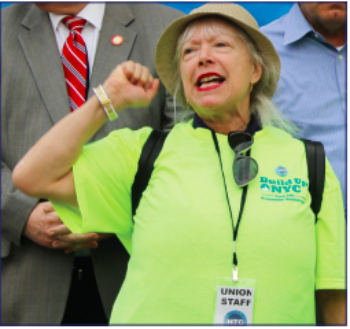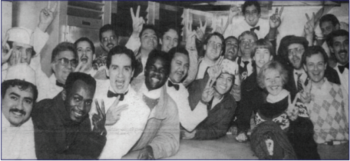Farewell, Retirees!


"Joining a Union,” says HTC Organizer Wendy Baranello, “is when a job becomes real, as opposed to just working on somebody’s whim.” After years working at the whim of Tavern on the Green management, Wendy fought to make her Food Server job “real,” and, along with her co-workers, won an HTC contract in 1989. She went on to 31 years as an HTC union member, and 15 more as an HTC Organizer. She retired in December of 2022, leaving behind countless union members and staff who trace their activism to her.
Wendy dates her own labor consciousness to the emerging women’s rights movement of the 1970s. President of her women’s group at William Patterson College, Wendy remembers “I thought that women should have the same rights as men and that we should certainly get paid as much as men, that women weren’t just caregivers and homemakers and supporters for the men in our lives, that we were full people in our own right.”
HTC Director of Mobilization Arisha Sierra-Blas joined the Union in 2010 as an intern, and she recalls, “Wendy inspired me to devote my life to the labor movement not just as an Organizer, but as a woman–when I saw her, I saw a strong, powerful woman.”
To fund her Acting degree, Wendy took a series of waitressing jobs, and she eventually began working at Tavern on the Green in 1978. She remembers owner Warner LeRoy modeled Tavern on “the Palace of Versailles,” complete with “glass-encased rooms that looked out on the park,” “all kinds of artifacts from around the globe,” and “celebrity guests: Broadway actors, cinema stars, directors.” Yet despite its opulence, there was no ladies’ locker room. “You can’t imagine what that was like.”
Wendy and her co-workers were represented by a series of weak, ineffective unions at Tavern, and as a result, faced unacceptable working conditions, wages below $6/hr, and abrupt staff firings. She heard about HTC from co-workers who held union banquet jobs at other hotels. “They said to us, ‘HTC really knows how to advocate for workers.’ And so it began.”
Over the next two years, though her acting career would be placed on hold indefinitely, Wendy became a star in a high stakes drama. Every morning, she walked to work through a line of scabs recruited by management to intimidate employees from striking. She remembers, “thousands of waiters lined up from 59th street all the way up the park.” Meanwhile, her supervisors ran “captive audience meetings, where I was hiding recorders in my pockets for the Union.” Even after HTC won union recognition, she and her fellow Delegates were fired for “participation in an illegal work stoppage.” When the fight was finally won in 1989, Wendy remembers “dignity and respect were the number one most important things we wanted when we organized. We got them.”
In the years that followed, Wendy became known for the unrivaled personal attention she extended to everyone she organized alongside. Redbury Front Office Cashier and HTC Organizer Njomza Dubovci says “Wendy taught me to listen, because when you listen, you learn.” Pierre Banquet Server and HEAT Organizer Antonio Codita says “Wendy showed me that organizing is not just a mission, it’s not just a task, it’s about people. HTC is not just thousands of workers, we are first of all people.”
Reflecting on her final years organizing before retirement, Wendy says “the pandemic was a real test. It’s like being on strike: you don’t realize it when you’re in the middle of it, but when you come out the other side you see that we did everything to stay in touch with our people, to keep our workers afloat. We aced the exam.” She says she’s been floored on phone calls with members in recent months, when many have said “I know you, you’re Wendy. Of course I’ll volunteer to defend the Union, you were there for me, you listened to me when I needed my Union in the pandemic.”
“That’s been an unexpected privilege,” Wendy says, “to be there for people.”


